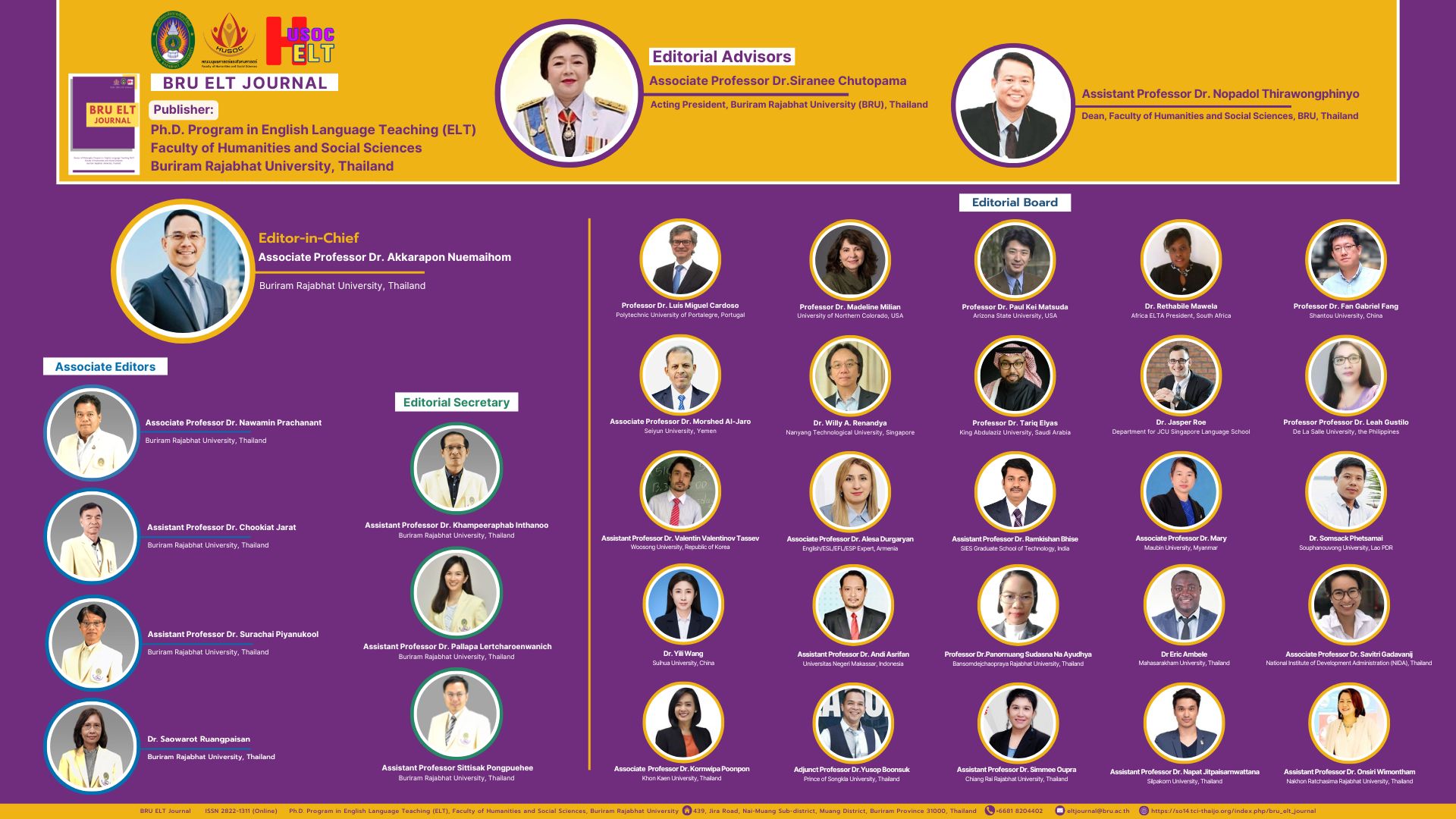Improving Grade 10 Students’ Expository Writing through Concept Mapping and Freewriting: A Quasi-Experimental Study
DOI:
https://doi.org/10.14456/bej.2024.4Keywords:
concept mapping, expository writing, freewritingAbstract
Good writing skills are essential for students to succeed academically. The purpose of this research was to determine the effectiveness of using concept mapping and freewriting in improving Grade 10 students’ expository writing in a public national high school in Villanueva, Misamis Oriental, Philippines. During the first week of classes, these students showed poor performance in the writing prompts given by the researcher. The study involved 37 participants in the experimental group and 42 in the control group. It aimed to compare the effectiveness of two different teaching methods, Concept Mapping and Freewriting. The research employed a quasi-experimental design and utilized a modified analytic rubric to assess the expository writing of both groups before and after applying these teaching interventions. Descriptive statistics, such as frequency, percentages, and means were utilized. T-Test for Paired Samples was also used to determine the significant difference between the students’ pretest and post-test results in expository writing, and T-Test for Independent Samples was employed to determine the difference in the score increment between the two groups. The findings reveal that both approaches were effective in improving students’ expository writing. This implies that both of the interventions were effective in improving the Grade 10 students' expository writing, however, Concept Mapping was found to be more effective than free writing. The study suggests the need to utilize these strategies in improving students’ expository writing and that further empirical investigation may be explored in another locale to increase the generalizability of the findings.
References
Al Badi, I. A. (2015). Academic writing difficulties of ESL learners. https://www.researchgate.net/publication/280696919_ACADEMIC_WRITING_DIFFICULTIES_OF_ESL_LEARNERS
Almubark, S. (2016). Teachers’ understanding of formative assessment. Jurnal Bahasadan Seni. Vol 45.
Ashraf, M., Rubab, I., & Ajmal, M. (2020). Investigating the Problems of Organization and Vocabulary in Academic Writing Encountered by Students at Postgraduate Level. International Journal of Advanced Science and Technology, 29(8), 2766-2779.
Bradshaw, W. (2013). Why is Grammar Important. https://m.huffpost.com/us/entry/4128521
Brown, H., & Abeywickrama, P. (2021). Language assessment: Principles and classroom practices. Pearson.
Cagas, R. L. (2016) The effectiveness of process writing approach in the expository writing of junior high school. [Unpublished master’s thesis] Lourdes College.
Cheng, K. (2019). Expository writing: A short guide. https://www.mq.edu.au/__data/assets/pdf_file/0005/784076/Expository-Scientific-Writing-A4.pdf
Chiang, Y. (2021). Effects of the concept-mapping method on international students. https://www.researchgate.net/publication/359919125_Effects_of_the_Concept-Mapping_Method_on_International_Students%27_Academic_Performance_and_Perceptions
Fairuza, A. (2020). The effect of using freewriting technique on students’ analytical exposition text writing ability of eleventh-grade students of SMA Swasta Harapan Bangsa Kuala. Serunai: Jurnal Ilmiah Ilmu Pendidikan, 7(2), 172-181. https://doi.org/10.37755/sjip.v7i2.514
Fawcett, S. (2018). Evergreen: A guide to writing with readings (11th ed.). Cenage Learning.
Gay, E. (2016). Encouraging students’ stimulation in writing through freewriting technique. Jurnal Pendidikan “Dodoto,” 11(11), 73-82.
Hyland, K. (2017). Second language writing - cambridge university press & assessment. https://www.cambridge.org/core/books/second-language-writing/B55667B789336DF8690E651E5111E6A4
Immelman, S., Carstens, A., Smith, S., & Masenge, A. (2020). Concept mapping as a strategy to scaffold concept literacy in accounting for extended programmes. South African Journal of Higher Education, 34(1). https://doi.org/10.20853/34-1-3075
John, D. (2017). Introducing free writing to college students to enhance their writing skills. Fortell, A Journal of Teaching English Language and Literature.
Juliati, J., Humaira, H., & Irwandi, I. (2019). The use of free-writing strategy in teaching writing at the eighth grade students of SMPN 1 Pajo in academic year 2018/2019. Repository.ummat.ac.id.
Kassem, H. M. (2017). The effectiveness of a blended strategy based on concept mapping and text structure in improving efl learners’ writing performance. EFL Journal, 2(2). https://doi.org/10.21462/eflj.v2i2.30
Khairi, H. D. (2017). Teaching by principles: An interactive approach to language pedagogy. Internet Archive. https://archive.org/details/ok-teaching-by-principles-h-douglas-brown
Krashen, S. (1999). Principles and practice in Second language acquisition. Phoenix ELT.
Kurniati, E., & Kusumastuti, D. (2019). Concept map strategy to organize ideas in writing exposition text. Jo-ELT (Journal of English Language Teaching) Fakultas Pendidikan Bahasa & Seni Prodi Pendidikan Bahasa Inggris IKIP, 6(1), 25. https://doi.org/10.33394/jo-elt.v6i1.2346
Lubold, S. L., Forbes, S., & Stevenson, I. (2016). The effect of topic selection on writing fluency among Japanese high school students. Indonesian Journal of Applied Linguistics, 5(2), 231. https://doi.org/10.17509/ijal.v5i2.1347
Marashi, H., & Kangani, M. (2018). Using concept mapping and mind mapping in expository and narrative writing classes. Journal of Language and Translation, 8(2), 93-106.
Mehrali, C. (2015). The comparison of fourth grade students essays based on free and guided writing techniques in terms of the quality of written expression. Educational Research and Reviews, 10(4), 444-452. https://doi.org/10.5897/err2014.1969
Morar, L.-L., Boştină-Bratu, S., & Negoescu, A. G. (2019). From word to idea: Freewriting. International Conference KNOWLEDGE-BASED ORGANIZATION, 25(2), 293-299. https://doi.org/10.2478/kbo-2019-0097
Nobahar, B., Tabrizi, A. R. N., & Shaghaghi, M. (2013). The effect of concept mapping on iranian intermediate EFL learners’ self-efficacy and expository writing accuracy. Theory and Practice in Language Studies, 3(11). https://doi.org/10.4304/tpls.3.11.2117-2127
Novak, J., & Canas, A. (2015). The theory underlying concept maps and how to construct them. https://web.stanford.edu/dept/SUSE/
projects/ireport/articles/concept_map
Park, J. (2020). Benefits of freewriting in an EFL academic writing classroom. Razeq (3), 318-326. https://doi.org/10.1093/elt/ccaa018
Puspitasari, D. (2019). Mechanical errors in academic writing: A case study at english language education department of uin sunan ampel surabaya . http://digilib.uinsa.ac.id/36263/2/Devi%20Puspitasari_D75215038.pdf
Rahman, R., & Ambreen, M. (2018). Concept mapping for improving expository writing in second language. Pakistan Journal of Education, 35(2). https://doi.org/10.30971/pje.v35i2.540
Reyes, I. (2018). EFL teachers’ beliefs and practices of formative assessment to promote active learning. The ASIAN EFL Journal. 20(5): 96-112.
Schwendimann, B. (2014). Concept mapping. Encyclopedia of Science Education, 1–5. https://doi.org/10.1007/978-94-007-6165-0_409-5
Syarfiah, U. (2019). The implementation of free writing in improving writing skill at the second grade student of SMP Negeri 31 Makassar. https://www.fkip-uim.ac.id/wp-content/uploads/2019/03/ARTICLE-JOURNAL-ULFI.pdf
Taber, K. (2018). Scaffolding learning: Principles for effective teaching and the design of classroom resources. https://www.researchgate.net/publication/327833000_Scaffolding_learning_Principles_for_effective_teaching_and_the_design_of_classroom_resources
Van de Pol, J., Volman, M., Oort, F., & Beishuizen, J. (2013). Teacher scaffolding in small-group work: An intervention study. Journal of the Learning Sciences, 23(4), 600-650. https://doi.org/10.1080/10508406.2013.805300
Vygotsky, L. (1978). Mind in society: Development of Higher Psychological Processes. Harvard UP.
Zhou, Q. (2021). The use of scaffolding theory in the teaching of writing. Journal of Higher Education Research, 2(6). https://doi.org/10.32629/jher.v2i6.583






